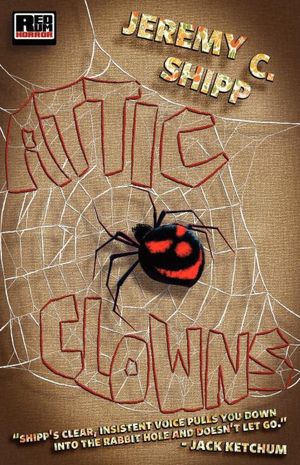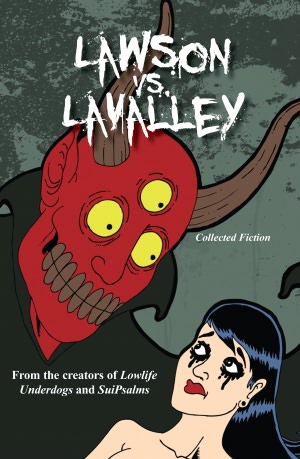Penned by the prolific Stephen
Beam, author of The Teddy Bear
Singularity, Monster in the Tree
and many others, this novella is a madcap existential adventure featuring a
colorful cast of characters, including a trained serpentine assassin, Satan; Gil,
a Filipino ritual-circumciser-cum-mad-scientist; and the titular character, Jake,
a bio-modified dog whose amazing physiognomy belies his less than amazing life—wasted
watching television, smoking, eating Velveeta nachos and vacuuming his own fur
from the sofa. One day, Jake decides he wants more, and embarks on a journey of
self-discovery which leads him to learn to read, piss on a religious
proselytizer, accidentally acquire a pet cat and promote bizarro fiction, among
other things. The outcome is genuinely surprising, yet strangely satisfying,
and as a creature equally blessed and cursed with self-consciousness, Jake’s story
is an allegory of our own as human beings (or bio-modified monkeys, if you
will). On one level, we simply want to satisfy our physical appetites for food,
sleep and sex; on another, deeper level, we need spiritual fulfillment. Through
it all, we’re haunted by the specter of death. A quick, enjoyably compelling read which teaches us that, I quote, “Life is more than banging poodles or smelling
asses.”
Wednesday, 29 February 2012
Saturday, 18 February 2012
Review of ATTIC CLOWNS by Jeremy C. Shipp (Redrum Horror, 2012)
Attic Clowns, the latest playfully macabre collection from Jeremy
C. Shipp, mixes horror, sci-fi, fantasy and slapstick with generous pinches of pathos,
clowns, claustrophobia and attics to make one delicious literary pie. Some of
these stories are allegories about the absurdity of work. In “The Quivering
Gray Fog,” a woman living in an attic attempts to piece together an apparently impossible
puzzle while a legion of demons make her home below into a living hell; in
“Giggles,” another woman, Joan, is cursed to entertain a clown forever, lest he
become bored, break free and wreak havoc on the world. Others address the
absurdity of family life. In “Blister”—one of my favorites—a melancholic
narrator, Corn, looks after his mentally ailing father, who does little but sit
at the dinner table reading books about the afterlife (including one in which
God is a T-Rex); in “Microcircus,” a woman struggles to manage miniature versions
of both herself and those she loves. A palpable sense of impending entropy
pervades the whole book, which is, paradoxically, rendered in Shipp’s
characteristically precise, controlled prose—easy to read, not so easy to
forget.
Sunday, 5 February 2012
Review of LAWSON VS. LAVALLEY by John Edward Lawson and Dustin LaValley (Raw Dog Screaming Press, 2011)
A good story to page count ratio
always gets my pulse racing, so when I examined this thin book’s table of
contents, I nearly had a heart attack: Thirty-five
stories in one hundred and twelve pages! I love collections like this precisely
because of their ability to introduce readers to a wide variety of characters
and place them in a range of settings, with such economy of words. Some of
these tales—those starring homicidal milkmen or a murderer of axes—are absurd, as the best flash fiction often is. Others
touch on sensitive personal and political issues like euthanasia and
homophobia. And there are imaginary horrors—winged demons from the sinkholes, a
possessed dildo, a rodent-munching vagina dentata, a vampiric gas tank—alongside
all-too-real ones like terminal illness and irrational, fundamentalist mobs. The
imagery utilized is always affecting, frequently grotesque. In “The Stoma
Laughs Last,” a sentient stoma drools bits of bloody stool when it speaks; in “The
Lightness of Being,” the slow dissection of a sacrificial victim is detailed.
To read and finish this is, for fans of the short and horrible, like waking up,
wide-eyed and sweaty, after a succession of satisfying nightmares.
Friday, 3 February 2012
DEFENDOR (Peter Stebbings, 2009)
A mentally disturbed road construction worker, played by Woody
Harrelson, fights crime at night, disguised as “Defendor” and armed only with a
jar of angry wasps, a few marbles and a highly-developed moral sensibility. He
rescues a crack whore, and friendship ensues.
Thursday, 2 February 2012
Review of NIGHT OF THE SQUIRRELS by Eric S. Brown
From the author of the Bigfoot
War series and Last Stand in a Dead Land
(among many others), these six shorts feature a zombie whale, a forest full of
savage squirrels, an undead peeping tom, a vigilante lizard man, a cameo appearance
from a band of murderous sasquatches, and a whole lot of blood and guts. The
settings are invariably bleak, usually post-apocalyptic. The main characters
are isolated and lonely, sometimes suicidal, often driven to kill in order to
survive. Groups of people are not to be trusted. The endings are downbeat, and yet
the whole collection manages to retain a relatively upbeat feel, due in large
part to the constant action—the pace of these stories is relentless—and abundance
of dry humor, with lines such as, “Perhaps the world descending into Hell was
taking a greater toll on him than he thought” and “The closest of the two died
quickly from an exploding head.” And I particularly like the reimagining of
biblical stories and themes in “Jonah and the Dead” and “Saviour,” the latter
of which stars a self-aware zombie who has a religious experience. This is
immensely readable, classic creature horror. Let’s hope the real apocalypse is this much fun.
Subscribe to:
Comments (Atom)



